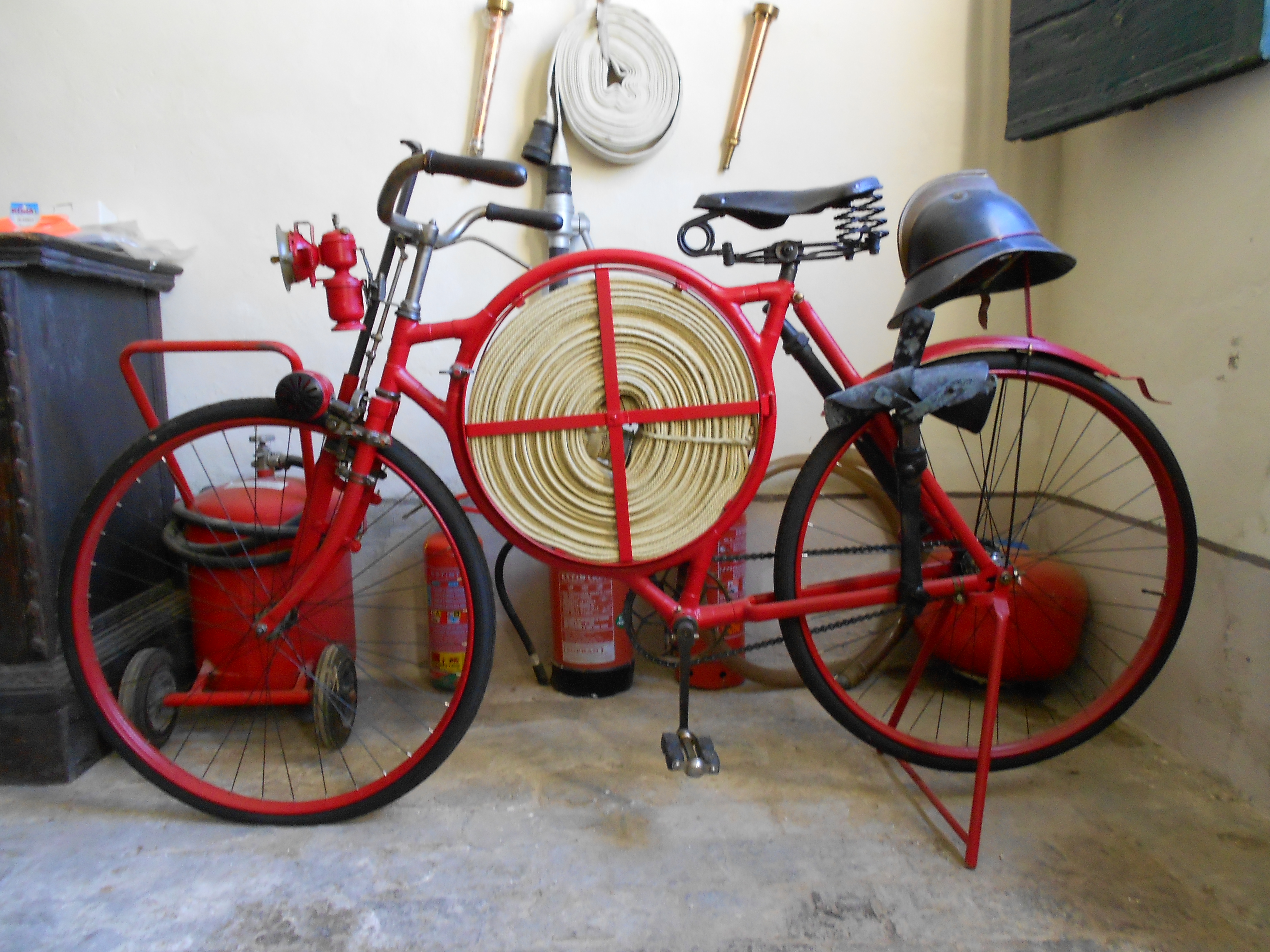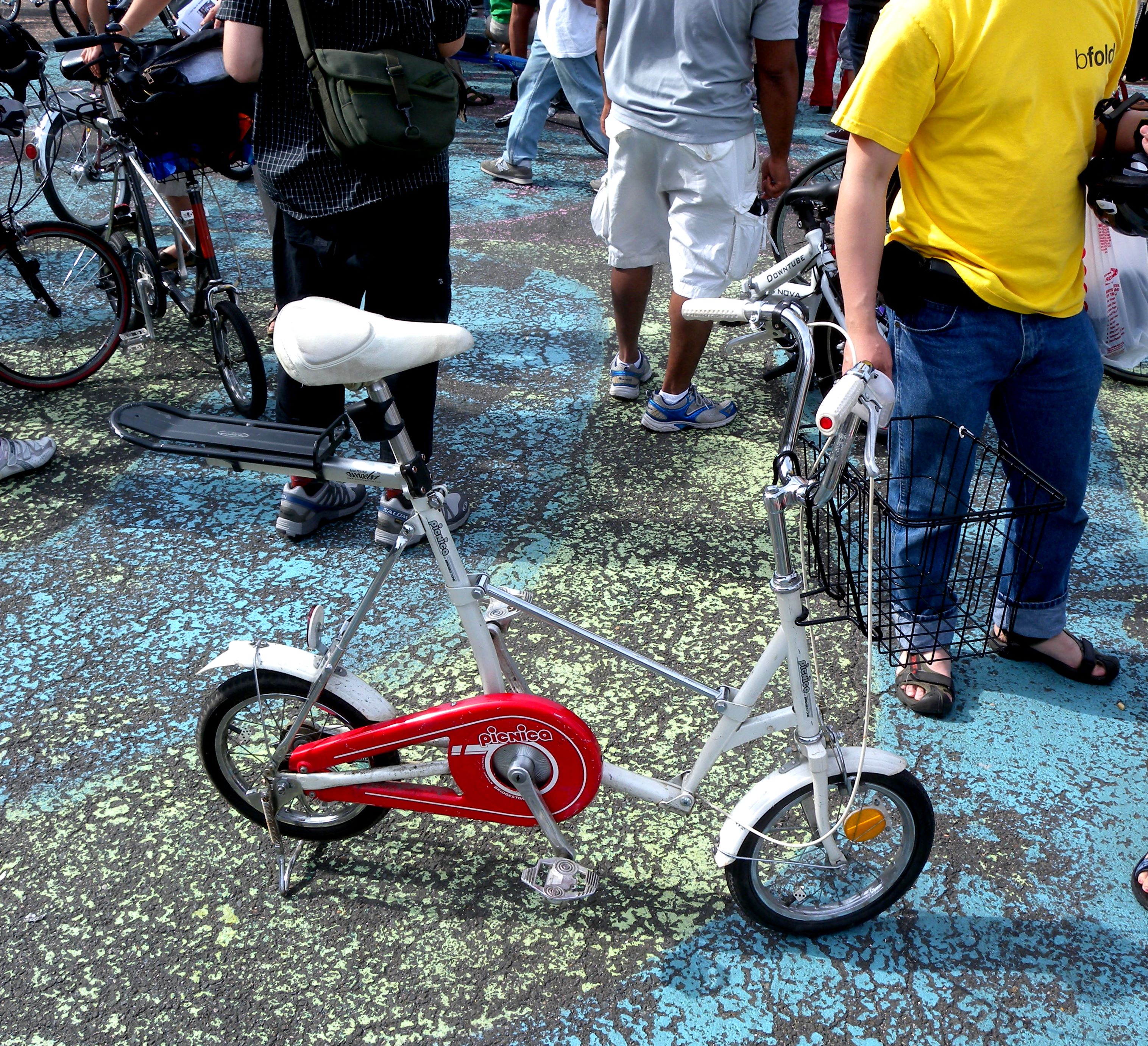|
Belt-driven Bicycle
A belt-driven bicycle is a chainless bicycle that uses a toothed synchronous belt to transmit power from the pedals to the wheel. The application of belt drives to bicycles is growing, especially in the commuter bicycle market, due to the low maintenance and lubrication-free benefits. Belt drives are also available for stationary and fitness bicycles. Benefits * Belts do not rust. * Lubrication is not required. ** Cleanliness due to lack of lubrication. ** Little to no maintenance. * Smoother operation. * Quieter than chain. * Longer life than metal bicycle chains. * Some belt systems are lighter than conventional chain-driven system. Drawbacks * Derailleurs cannot be used, so a hub gear is used if multiple gear ratios are required. * Most belts cannot be taken apart as a chain can, so a frame must be able to accommodate the belt by having an opening in the rear triangle or an elevated chain stay. There is only one option where the belt can be spliced and joined thr ... [...More Info...] [...Related Items...] OR: [Wikipedia] [Google] [Baidu] |
Bicycle Belt Drive 2
A bicycle, also called a pedal cycle, bike or cycle, is a human-powered or motor-powered assisted, pedal-driven, single-track vehicle, having two wheels attached to a frame, one behind the other. A is called a cyclist, or bicyclist. Bicycles were introduced in the 19th century in Europe. By the early 21st century, more than 1 billion were in existence. These numbers far exceed the number of cars, both in total and ranked by the number of individual models produced. They are the principal means of transportation in many regions. They also provide a popular form of recreation, and have been adapted for use as children's toys, general fitness, military and police applications, courier services, bicycle racing, and bicycle stunts. The basic shape and configuration of a typical upright or "safety bicycle", has changed little since the first chain-driven model was developed around 1885. However, many details have been improved, especially since the advent of moder ... [...More Info...] [...Related Items...] OR: [Wikipedia] [Google] [Baidu] |
Eccentric (mechanism)
In mechanical engineering, an eccentric is a circular disk (''eccentric sheave'') solidly fixed to a rotating axle with its centre offset from that of the axle (hence the word " eccentric", out of the center). It is used most often in steam engines, and used to convert rotary motion into linear reciprocating motion to drive a sliding valve or pump ram. To do so, an eccentric usually has a groove at its circumference closely fitted a circular collar (''eccentric strap''). An attached ''eccentric rod'' is suspended in such a way that its other end can impart the required reciprocating motion. A return crank fulfills the same function except that it can only work at the end of an axle or on the outside of a wheel whereas an eccentric can also be fitted to the body of the axle between the wheels. Unlike a cam, which also converts rotary into linear motion at almost any rate of acceleration and deceleration, an eccentric or return crank can only impart an approximation of simple ha ... [...More Info...] [...Related Items...] OR: [Wikipedia] [Google] [Baidu] |
Gates Corporation
Gates Industrial Corporation plc, based in Denver, Colorado, is a manufacturer of power transmission belts and fluid power products, which are used in diverse industrial and automotive applications. The company employs over 14,000 and has sales and manufacturing operations in North and South America, Europe, Asia, Australia, and the Middle East. History On October 1, 1911, Charles Gates Sr. purchased the Colorado Tire and Leather Company located in Denver, Colorado beside the South Platte River. Colorado Tire and Leather Company made a single product, the Durable Tread, a steel-studded band of leather that motorists attached to tires to extend their mileage. In 1917, the company began phasing out leather in favor of rubber and Charles Gates changed its name to the International Rubber Company. That same year, John Gates, Charles's brother, developed a belt made of rubber and woven threading called a V-belt, due to its shape. It replaced the hemp and rope belt used on automobiles ... [...More Info...] [...Related Items...] OR: [Wikipedia] [Google] [Baidu] |
Royal College Of Art
The Royal College of Art (RCA) is a public research university in London, United Kingdom, with campuses in South Kensington, Battersea and White City. It is the only entirely postgraduate art and design university in the United Kingdom. It offers postgraduate degrees in art and design to students from over 60 countries. History The RCA was founded in Somerset House in 1837 as the Government School of Design or Metropolitan School of Design. Richard Burchett became head of the school in 1852. In 1853 it was expanded and moved to Marlborough House, and then, in 1853 or 1857, to South Kensington, on the same site as the South Kensington Museum. It was renamed the Normal Training School of Art in 1857 and the National Art Training School in 1863. During the later 19th century it was primarily a teacher training college; pupils during this period included George Clausen, Christopher Dresser, Luke Fildes, Kate Greenaway and Gertrude Jekyll. In September 1896 the school re ... [...More Info...] [...Related Items...] OR: [Wikipedia] [Google] [Baidu] |
Imperial College
Imperial College London (legally Imperial College of Science, Technology and Medicine) is a public research university in London, United Kingdom. Its history began with Prince Albert, consort of Queen Victoria, who developed his vision for a cultural area that included the Royal Albert Hall, Victoria & Albert Museum, Natural History Museum and royal colleges. In 1907, Imperial College was established by a royal charter, which unified the Royal College of Science, Royal School of Mines, and City and Guilds of London Institute. In 1988, the Imperial College School of Medicine was formed by merging with St Mary's Hospital Medical School. In 2004, Queen Elizabeth II opened the Imperial College Business School. Imperial focuses exclusively on science, technology, medicine, and business. The main campus is located in South Kensington, and there is an innovation campus in White City. Facilities also include teaching hospitals throughout London, and with Imperial College Healthca ... [...More Info...] [...Related Items...] OR: [Wikipedia] [Google] [Baidu] |
Mark Sanders (designer)
Mark Andrew Sanders is a British designer and engineer. He is the designer of the Strida triangular folding bicycle, as well as the No-Spill Chopping Board, held in the permanent collection of the Museum of Modern Art. Biography Sanders graduated from the Industrial Design Engineering (IDE) course at the Royal College of Art/Imperial College."ifworlddesignguide.com" ''https://ifworlddesignguide.com'', Retrieved 3 June 2020 During his time at RCA, Sanders designed the Strida folding bicycle. The Strida, noted for its simplicity, is featured in the book ''Fifty Bicycles that Changed the World'' by Alex Newson. Sanders is the principal of MAS Design, a product design and engineering consultancy established ... [...More Info...] [...Related Items...] OR: [Wikipedia] [Google] [Baidu] |
Folding Bicycle
A folding bicycle is a bicycle designed to fold into a compact form, facilitating transport and storage. When folded, the bikes can be more easily carried into buildings, on public transportation (facilitating mixed-mode commuting and bicycle commuting), and more easily stored in compact living quarters or aboard a car, boat or plane. Folding mechanisms vary, with each offering a distinct combination of folding speed, folding ease, compactness, ride, weight, durability, and price. Distinguished by the complexities of their folding mechanism, more demanding structural requirements, greater number of parts, and more specialized market appeal, folding bikes may be more expensive than comparable non-folding models. The choice of model, apart from cost considerations, is a matter of resolving the various practical requirements: a quick, easy fold, a compact folded size, or a faster but less compact model. There are also bicycles that provide similar advantages by separating into ... [...More Info...] [...Related Items...] OR: [Wikipedia] [Google] [Baidu] |
Chainring
The crankset (in the US) or chainset (in the UK), is the component of a bicycle drivetrain that converts the reciprocating motion of the rider's legs into rotational motion used to drive the chain or belt, which in turn drives the rear wheel. It consists of one or more sprockets, also called ''chainrings'' or ''chainwheels'' attached to the '' cranks'', ''arms'', or ''crankarms'' to which the pedals attach. It is connected to the rider by the pedals, to the bicycle frame by the bottom bracket, and to the rear sprocket, cassette or freewheel via the chain. Parts Cranks The two ''cranks'', one on each side and usually mounted 180° apart, connect the bottom bracket axle to the pedals. Lengths Bicycle cranks can vary in length to accommodate different sized riders and different types of cycling. Crank length is measured from the center of the pedal spindle to the center of the bottom bracket spindle or axle. The larger bicycle component manufacturers typically offer ... [...More Info...] [...Related Items...] OR: [Wikipedia] [Google] [Baidu] |
Harley-Davidson
Harley-Davidson, Inc. (H-D, or simply Harley) is an American motorcycle manufacturer headquartered in Milwaukee, Wisconsin, United States. Founded in 1903, it is one of two major American motorcycle manufacturers to survive the Great Depression along with its historical rival, Indian Motorcycles.Automotive – RSS Feed . ''''. Retrieved July 7, 2011. The company has survived numerous ownership arrangements, subsidiary arrangements, periods of poor economic health and product quality, and intense global competition to become one of the world's largest motorcycle manufacturers and an iconic brand widely known for its loy ... [...More Info...] [...Related Items...] OR: [Wikipedia] [Google] [Baidu] |
Timing Belt (camshaft)
In a piston engine, either a timing belt (also called a ''cambelt'') or timing chain or set of timing gears is used to synchronize the rotation of the crankshaft and the camshaft. This synchronisation ensures that the engine's valves open and close at the correct times in relation to the position of the pistons. Design In most piston engines, the camshaft(s) are mechanically connected to the crankshaft. The crankshaft drives the camshaft (via a timing belt, timing chain or pushrods), which in turn actuates the intake and exhaust valves. These valves allow the engine to inhale air (or an air/fuel mixture) and exhale the exhaust gasses. The most common devices to transfer the drive are toothed rubber belts, metal timing chains or a set of gears. The teeth of the belt/chain/gears mesh with both the crankshaft and camshaft(s), thereby synchronising their motion. In many older overhead valve engines, the camshaft is located in the block near the crankshaft, therefore a simple g ... [...More Info...] [...Related Items...] OR: [Wikipedia] [Google] [Baidu] |
Bridgestone Picnica
The Bridgestone Picnica (Japanese: Burijisuton Pikunika: ブリヂストン 「ピクニカ」) line of collapsible bikes, some models featuring belt-drives, were introduced in the early 1980s and carried in the Bridgestone Cycle USA catalogs from 1985 through 1990. It weighs 29 pounds, and belt-drive models use a tooth-belt drive like auto timing belts and Harley-Davidson drive belts, along with a novel two-part chainring that increases belt tension with increasing load. In April 1987, ''Popular Mechanics'' described Bridgestone's Beltrex system as follows: "Unlike the belt-drive motorcycles, which can slide the rear wheel back to keep the belt taut, the Beltrex uses a floating pulley that's cogged to the drive gear. Tension on the pedal cranks drives the floating pulley forward, taking up belt slack and preventing tooth slippage." The Picnica is a folding bicycle, and part of the appeal of the belt drive is cleanliness. It is a small wheel bicycle Small may refer to: Science ... [...More Info...] [...Related Items...] OR: [Wikipedia] [Google] [Baidu] |





.jpg)


